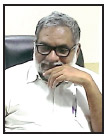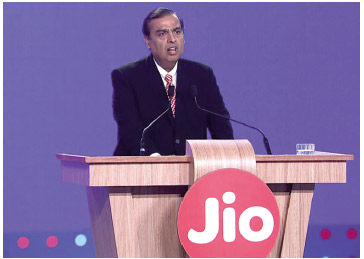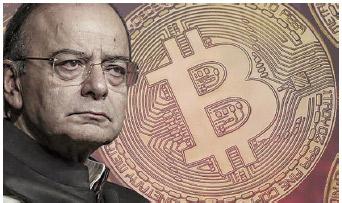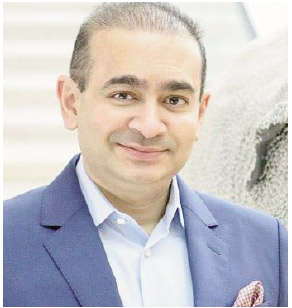Blockchain technology
is the solution
 K R Sudhaman
K R Sudhaman
 Mukesh Ambani
Soon after Finance Minister
Arun Jaitley announced in
the budget in February this
year that Cryptocurrency
was not a legal tender in
India, it has been reported
that the Mukesh Ambani-led Reliance
Jio is planning to launch its own virtual
currency – JioCoin. Recently in
Bengalure an ATM has been set up a
private player for crypto-currency.
Earlier British bank HSBC has
executed India's first financial
transaction using Blockchain for a
deal involving an export by Reliance
Industries to an American client. The
Blockchain-enabled letter of credit
transaction was for a shipment from
the Mukesh Ambani-led company to
US-based Tricon Energy, and helped
reduce the time required to process
the documents.
Mukesh Ambani
Soon after Finance Minister
Arun Jaitley announced in
the budget in February this
year that Cryptocurrency
was not a legal tender in
India, it has been reported
that the Mukesh Ambani-led Reliance
Jio is planning to launch its own virtual
currency – JioCoin. Recently in
Bengalure an ATM has been set up a
private player for crypto-currency.
Earlier British bank HSBC has
executed India's first financial
transaction using Blockchain for a
deal involving an export by Reliance
Industries to an American client. The
Blockchain-enabled letter of credit
transaction was for a shipment from
the Mukesh Ambani-led company to
US-based Tricon Energy, and helped
reduce the time required to process
the documents.
Venezuela, which is facing unilateral
sanctions from the United States, has
set up its own cryptocurrency called
Petro to enable other countries make
payments for purchase of oil from that
country. It has even offered India a 30
per cent discount on crude oil
purchases if New Delhi uses the
country’s new blockchain technologybased
cryptocurrency. Petro is the
world’s first state-backed
cryptocurrency tied to the South
American country’s oil reserves.
 Arun Jaitley
Many see this as the safest
cryptocurrency, as Venezuela has the
world’s largest oil reserves of 300
billion barrels. The world’s largest oil
producer, Saudi Arabia, is a distant
second, with 266 billion barrels of oil
reserves.
Arun Jaitley
Many see this as the safest
cryptocurrency, as Venezuela has the
world’s largest oil reserves of 300
billion barrels. The world’s largest oil
producer, Saudi Arabia, is a distant
second, with 266 billion barrels of oil
reserves.
But there are varied views about
cryptocurrency and Blockchain
technology on which this digital currency operates. Some call it a
bubble while some others see
cryptocurrency as an insurance policy
to protect against the conventional
monetary system. Some feel it is
prudent to keep a mix between
Bitcoins and other methods such as
cash and precious metals
Jaitley underlined that the
virtual currencies,
including Bitcoin, don't
have any intrinsic value
and are not backed by
any kind of assets.
Cryptocurrencies were
not legal tender and
those indulging in such
transactions were doing it
at their own risk.
A blockchain, originally block
chain, is a growing list of records,
called blocks, which are linked using
cryptography. Each block contains a
cryptographic hash of the previous
block, a timestamp, and transaction
data. By design, a blockchain
technology is resistant to
modification of the data.
There are multiple applications of
blockchain technology on which
cryptocurrency operates. Blockchain
solutions is a distributed database that
maintains a continuously-growing list
of ordered records called blocks and is
deemed to be very transparent as all
the stakeholders can view progress
real time. Many domestic lenders,
including ICICI Bank, SBI and Yes Bank
among others are working on
Blockchain solutions and count trade
finance as one of the best use cases for
the technology because of the ability
to cut down on time.
HSBC's head of global banking and
markets Hitendra Dave said
blockchain has a transformative
impact on trade finance transactions
and enables greater transparency and
enhanced security in addition to
making it simpler and faster.
That
apart, it can ensure cost effectiveness,
quicker turnaround and also
potentially unlock liquidity for
businesses.
Jaitley, however, underlined that
the virtual currencies, including
Bitcoin, don't have any intrinsic value and are not backed by any kind of
assets. Cryptocurrencies were not
legal tender and those indulging in
such transactions were doing it at their
own risk. The Income Tax conducted a
survey on nine major cryptocurrency
exchanges to investigate instances of
tax evasion. The Tax authority has
reportedly found that there are 6 lakh
active cryptocurrency traders in the
country. Operations by
cryptocurrencies are banned in India
and hence all of them closed shop.
Who thought 20-30 years
back internet and mobile
phone would become
important and very useful
tool in day-to-day life.
Likewise Blockchain
technology is work in
progress who knows it
could turn out to be
revolutionary technology
in digital system.
 Nirav Modi
The closure of exchanged after
RBI’s warning that it has not given any
licence or authorisation to any entities
to operate such schemes or deal with
bitcoin or any virtual currency. The
government has already constituted a
panel under Economic Affairs
secretary to deliberate over all issues related to cryptocurrencies and
propose specific actions that need to
be taken.
Nirav Modi
The closure of exchanged after
RBI’s warning that it has not given any
licence or authorisation to any entities
to operate such schemes or deal with
bitcoin or any virtual currency. The
government has already constituted a
panel under Economic Affairs
secretary to deliberate over all issues related to cryptocurrencies and
propose specific actions that need to
be taken.
Though government has banned
use of cryptocurrencies, Jaitley himself
announced that government would
explore use of Blockchain technology,
which has several useful applications.
According former RBI Deputy
Governor Usha Thorat, Blockchain
technology can prevent Nirav Modi
like bank frauds if adopted in the
country’s banking and financial
system. Nirav Modi cannot happen at
all as under Blockchain,
simultaneously the message goes to
all concerned. Who has opened LC
(letter of credit) and messages are sent
to every user of the Blockchain.
It is
very solid system as every transaction
and its execution is recorded besides it
cannot be reversed. So, smart
transactions (like that of Nirav Modi)
could be under check in block chain
technology.
Diamond merchant Nirav Modi
allegedly defrauded Punjab National
Bank of over 11,300 crore. According
to a report in United States Bankruptcy
Court, Niravs) Modi companies used
funds raised from one bank to repay
outstanding letters of undertakings
(LoUs) from other bank in vicious cycle
that broke out only when the scam
was exposed. Jaitley informed Rajya
Sabha during the monsoon session
that Mumbai branch of Punjab
National Bank had issued a total of
1213 LoUs fraudulently to Nirav Modi
group of companies since 2011.
Former RBI governor Raghuram
Rajan, sometime back, had, however,
expressed his concerns over the
cryptocurrency such as the regulation
of the digital currency, the volatility of
the currency and the credibility issues
And most importantly the anonymity
of transaction will not merely
exacerbate the economic condition of
the world, but also it will pose a threat
towards peace and tranquility by
terror funding, smuggling and the like.
Rajan however did not rule out
possibilities of the virtual currencies in
the near future with the further
development of the technology.
Who thought 20-30 years back
internet and mobile phone would
become important and very useful
tool in day-to-day life. Likewise
Blockchain technology is work in
progress who knows it could turn out
to be revolutionary technology in
digital system.
As of now India’s policy on Bitcoin
regulation is still evolving and no legal
framework exists. The RBI has
cautioned against its use, informing
users, holders, investors and traders
dealing with virtual currencies that
they are doing so at their own risk.
Investigating agencies worry about the
absence of controls. They see any
transaction using cryptocurrency and
involving foreign exchange as a
contravention of the Foreign Exchange
Management Act (FEMA) and the FEM
(Manner of Receipt & Payment)
Regulations. Supreme Court has
issued an appeal to the government to
start the drafting of a regulatory
framework to ‘control the flow of
Bitcoin’ in the country.
Presently, there are over 1300
virtual currencies in operation
worldwide. India has identified 11
exchanges dealing with virtual
currencies. The value of Bitcoin have
fallen by around 70% since its peak
late last year. The value of leading
coins such as Ether, EOS, Litecoin,
and XRP have all fallen by over 80%,
thousands of other cryptocurrencies
have plummeted by 90-99%, and the
rest have been exposed as outright
frauds.
Nouriel Roubini, a professor at
NYU’s Stern School of Business and
CEO of Roubini Macro Associates, has
expressed a view in an article in
Project Syndicate that in practice,
Blockchain is nothing more than a
glorified spreadsheet. But it has also
become the byword for a libertarian
ideology that treats all governments,
central banks, traditional financial
institutions, and real-world currencies
as evil concentrations of power that
must be destroyed. Blockchain
fundamentalists’ ideal world is one in
which all economic activity and human
interactions are subject to anarchist or
Under Blockchain
technology, there are
identified nodes. It has
certain protocol, which
can be changed but not
retrospectively. Apart
from its use in finance,
Blockchain can be used
for remittances, cross
border transfers, stock
markets, depositories
and customs. It can also
be used in healthcare,
education and insurance,
besides payment
systems.
cryptocurrency trading. Fully 99% of all
transactions occur on centralized
exchanges that are hacked on a
regular basis. And, unlike with real
money, once your crypto wealth is
hacked, it is gone forever. Wealth in
the crypto universe is even more
concentrated than it is in North Korea.
Roubini, who has been senior
economist in World Bank and IMF
earlier, is of the view that no serious
institution would ever allow its
transactions to be verified by an
anonymous cartel operating from the
shadows of the world’s authoritarian
kleptocracies. So it is no surprise that
whenever “blockchain” has been
piloted in a traditional setting, it has
either been thrown in the trash bin or
turned into a private permissioned
database that is nothing more than an
Excel spreadsheet or a database with a
misleading name.
In India there were allegations that
cryptocurrencies were widely used
particularly by politicians of ruling and
opposition parties for money
laundering, especially after
demonetization. This was believed to
be more rampant in Gujarat, where
most of the exchanges once operated.
NITI Aayog is now working a
Blockchain initiative called India
Chain as the technology had wide
application in digital economy.
Telangana, Andhra Pradesh,
Maharashtra, Goa and Uttar Pradesh
are using Blockchain technology for
land records. Andhra Pradesh has
already taken the lead. An expert
group in RBI is also exploring the
possibility of digital currency in the
country.
Under Blockchain technology,
there are identified nodes. It has
certain protocol, which can be
changed but not retrospectively. Apart
from its use in finance, Blockchain can
be used for remittances, cross border
transfers, stock markets, depositories
and customs. It can also be used in
healthcare, education and insurance,
besides payment systems.
Philippines is using for overseas
remittances. Following US sanctions,
Venezuela government has launched
cryptocurrency ‘petro’. It is backed by
the country’s oil and mineral reserves
including gold and diamonds.
Venezuela ambassador to India
Augusto Montiel at a lecture on
Blockchain and cryptocurrency by
Usha Thorat, said his country had to go
for cryptocurrency as “we have been
financially and commercially blocked.
Because of unilateral US sanction, we
cannot use dollar. We cannot buy food
or medicine. There is humanitarian
crisis. The country had to intervene.
Now thousands of euros, dollars and
Yuan are waiting for November one to
use petro cryptocurrency to buy oil.”
Thorat said the advantage of
Blockchain technology is that it
eliminates all intermediaries in
securities market. It can be useful for
clearing corporation of India to look at
for wholesale clearing of foreign
exchange. But she also warned
cryptocurrency that uses Blockchain
technology has several pitfalls that’s
why many countries like India are
wary of it. Cryptocurrency has security
concerns and moneylaundering
issues. It can also be used for terror
funding, havala transactions,
smuggling and other nefarious
activities including tax evasion and
avoidance.
There are plus and minuses of
crypto currencies. But the
technological platform on which it is
based on Blockchain have several
positive uses. As it is a fast evolving
technology some minuses that it has
can be corrected to make it full proof.
Crypto-currency, whether it is a bubble
or not, only time will tell. It largely
depended on the evolution proper
regulatory mechanism by central
banks, some of which are already
looking at developing sovereign digital
currencies, which could be regulated.
The G20 summit in Argengina in
November end is also expected to
discuss this issue threadbare.
(K R Sudhaman, a senior
journalist, who has been an
Editor Press Trust of India and
Economics Editor in TickerNews
and Financial Chronicle)




 K R Sudhaman
K R Sudhaman
 Mukesh Ambani
Mukesh Ambani
 Arun Jaitley
Arun Jaitley
 Nirav Modi
Nirav Modi